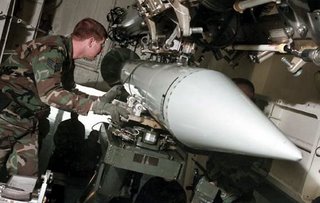
Lock & load - a B61-11 being prepared on a B2 bomber
George W Bush has dismissed reports in this week’s New Yorker magazine that he was considering a “tactical nuclear strike” on Iran. The article, written by Seymour Hirsch, said one of the military’s initial option plans, as presented to the White House by the Pentagon this winter, called for the use of a bunker-buster tactical nuclear weapon, such as the B61-11, against underground nuclear sites. The Brookings Institute described the B61-11 as having “unique earth-penetrating characteristics”. Despite its useful properties there has been widespread discussion on the use of such weapons. On July 8, 1996, the International Court of Justice ruled that any use or threat of use of nuclear weapons, other than possibly in the case where the very survival of a nation was threatened, was against international law. After this landmark decision, it is difficult to legally support the deployment, let alone the new development, of any tactical nuclear weapon? Especially one whose development appears to have been motivated by a desire to target non-nuclear weapon states. Upon publication, the US President dismissed the article as “wild speculation” [Sky News]. EU foreign policy chief Javier Solana insisted that Europe would have no involvement in any such action. “Any military action is out of the question for us,” he said.
And as the world reeled to he latest revelations coming from the White House, Mahmoud Ahmedinejad has said that Iran would “soon join” the world nuclear technology club. The Iranian president has been highly criticized over recent months for not cooperating with the international community and specifically the IAEA. If a strike against Iran were to be initiated, one target would be Iran’s main centrifuge plant, at Natanz, nearly 300 km south of Tehran. But one Pentagon adviser questioned the value of air strikes. “The Iranians have distributed their nuclear activity very well, and we have no clue where some of the key stuff is. It could even be out of the country,” he said. He warned, as did many others, that bombing Iran could provoke “a chain reaction” of attacks on American facilities and citizens throughout the world: “What will 1.2 billion Muslims think the day we attack Iran?” A question that should be seriously considered by all involved.

No comments:
Post a Comment